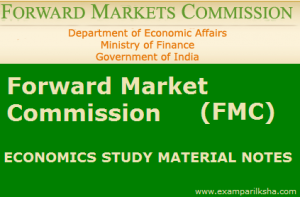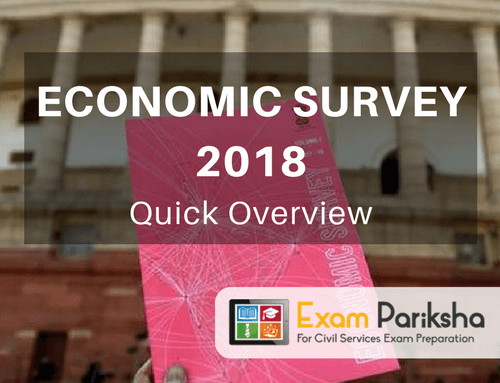Forward Markets Commission (FMC) – Economics Study Material & Notes
What are forward markets?
‘Forward’ or ‘Futures’ are contracts for commodities that are traded at futures exchange similar to shares, but here, actual physical goods are traded. Futures/forwards contracts are traded on foreign currencies and interest rates also. The commodities that are traded in futue contracts are corn, crude oil, silver, gold, etc. There are certain benefits of these futures trading :
- This hedges the participants against price risk(fluctuation in prices influenced by ecological, political or economic factors)
- Commodity exchanges help in production(farmers observe the price trends and decide which product to cultivate and in what amount) as well as procurement planning(for industries which buy agricultural products as raw materials).
- It enables the participation of various informed industry participants, which allow for efficient price discovery, discounting the local and global factors.
What was the NSEL Crisis?
National Spot Exchange of India (NSEL), an electronic trading platform where producers and traders could buy and sell agriculture and industrial commodities. NSEL had permitted bidding greater than the underlying assets and for longer durations than its mandated T+10=11 days duration. Therefore, a payment crisis at NSEL. Dues went unpaid to the tune of Rs. 5,600 crore.
The NSEL was being regulated by APMC(Agricultural Produce Market Committee) because it was a spot exchange not a futures exchange. But, it was acting as a futures exchange in violation of the rules without proper margin and settlement systems in place.
Therefore, after this crisis FMC is brought under finance ministry from Consumer affairs. This follows the logic that – regulations for commodities and stocks are similar since both are securities and involve trading of underlying assets.

Let us study the details about the FMC now:
- The Forwards Market Commission is a statutory entity which is involved in monitoring and regulating the operations, activities of the Commodities futures market in India.
- It is setup under the Forward Contracts (Regulation) Act of 1952.
- FMC has its headquarters in Mumbai and a regional office in Kolkata.
- It earlier functioned under the Ministry of Consumer affairs, this was prior to the NSEL crisis. Now it functions under the Department of Economic Affairs of Ministry of Finance.
Objectives of Forward Markets Commission (FMC):
The Forward Markets Commission (FMC), is the chief regulator of the Forwards and Futures market in the country. The Commission gives regulatory insights to ensure financial integrity, and market integrity. It works towards protecting and promoting the interest of consumers or non-participants.
The FMC assesses the market situation and takes into account the recommendations made by the Commodity exchanges for prescribing the rules and regulations of the Exchange. The Commission accords permission for conducting trade in distict contracts, while monitoring the market conditions continuously. It takes remedial measures wherever necessary to impose regulatory measures.
Composition:
According to the Forward Contracts(Regulation) Act,1952 the commission should comprise of 2 members and a Chairman. These all three are appointed by the Central government. Generally, the Chairman is a member of the Indian Administrative Services and the members are from the Indian Economic Services.
Functions of FMC:
Forward Market Commission functions as a sole institution governing the commodities market in India. It executes a variety of roles.
- It counsels the Central Government for matters regarding recognition or withdrawal of the previously accorded recognition from any of the registered association.
- It also provides advice on any other matters that arise as a result of the administration of the Forward Contracts (Regulation) Act 1952.
- FMC provides suggestions to uplift and improve the functioning of the Commission as well as the Futures markets.
- The Commission can cross-check and inspect the accounts as well as any other documents of the registered associations and their members.
- It keeps a vigil on the Future commodities market and also exercises its discretionary powers in the interest and growth of the markets and consumers.
- FMC is mandated to source, collect and publish the information about trading conditions for various commodities covered under the purview of the governing act. These details are generally about the demand, supply and prices.
Commodity exchanges:
There are 22 exchanges in the country. Out of these twenty two, there are 6 National level exchanges involved in the Forward Commodity trading in India. These important six national exchanges are:
- MCX (Multi-commodity Exchange of India Limited) located in Mumbai.
- NCDEX (National Commodity and Derivatives Exchange Limited) situated in Mumbai.
- NMCE (National Multi-commodity Exchange of India Limited) located in Ahmedabad.
- ICEX (Indian Commodity Exchange Limited) based in New Delhi.
- ACEINDIA (Ace Derivatives and Commodity Exchange Limited) located in Mumbai.
- UCX (Universal Commodity Exchange Limited) located in Navi Mumbai
Of these six exchanges, the top three are important with respect to questions in exams.





